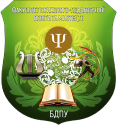About the Department of Pedagogy
The history of the modern Department of Pedagogy dates back to 1932, when the Berdyansk Pedagogical Institute was founded. In different years, the department was headed by Yuriy Gorbenko, Borys Praysman, Dmytro Lober, Ivan Oplakansky, Vira Perepelytsia, Yevhen Volsky, Vasyl Demydenko, Heorhiy Kashkaryov, Olena Holub, Lyudmila Chulkova, Serhiy Ulyukayev, Olga Popova, Larisa Lisina. Since the 2024–2025 academic year, the Department of Pedagogy of the Berdyansk State Pedagogical University has been headed by Kristina Petryk.
In September 2001, two departments were created on the basis of the Department of Pedagogy and Psychology - the Department of Pedagogy and the Department of Psychology.
The Department of Pedagogy - one of the structural units of the Faculty of Psychological and Pedagogical Education and Arts - constantly carries out scientific and methodological research, strives for development and improvement. The conceptual principles of the effective functioning of the department are national ideas, professionalism, and professional individuality of teachers. All efforts of the department are aimed at forming professional competence in future teachers, promoting the continuity of their theoretical and practical training, organizing cooperation between teachers and higher education students in scientific and research activities, supporting future teachers in innovative educational and professional fields, achieving success in personal development, and successful employment. The implementation of these ideas allows for the scientific, methodological, and psychological, and pedagogical training of a future specialist who meets modern requirements, is competitive in the labor market, competent, and responsible, and is able to use the knowledge gained in practice. The content of the activities of scientific and pedagogical workers has been enriched with the managerial components of educology, indigenous ideas of leadership and management of education, since since September 2024 the department is a graduation department for the specialty 011 Educational, pedagogical sciences of the second (master's) level of higher education and prepares applicants for the educational and professional program "Management of an educational institution".
The strategic directions of the department are the optimization of the interaction of all participants in the educational process, the implementation of innovative principles and forms of its organization in accordance with the Pedagogical Constitution of Europe, the requirements of the European Higher Education Area; the development of the educational environment based on the potential of national culture and ethnopedagogy, ensuring creativity, pedagogical improvisation and mobility of future specialists, awareness of the priority of the quality of education as a scientific and methodological basis for the comprehensive training of specialists for work in conditions of change and uncertainty.
Since September 2024, the Department has been operating a research institute for leadership in education (headed by Candidate of Pedagogical Sciences, Professor Vasyl Kryzhko), which studies the effective management of the development of leadership traits (qualities) in future teachers and heads of educational institutions. The Institute is a scientific testing ground for the introduction of a leadership paradigm in the educational polyparadigm space, and its employees generate new ideas for the true self-realization of the resource and potential of each subject of the educational and management process.
The Department's scientific and pedagogical staff are active participants and organizers of various educational events aimed at shaping the personality of a future specialist with an active life position, the development of civic consciousness, high moral and spiritual qualities, and the ability to work in interdisciplinary teams, which are necessary for the sustainable development of Ukrainian society and active participation in its development.
Particular attention is paid to the development of critical thinking skills, social responsibility, tolerance, the ability for self-reflection, self-development, self-discipline and ethical behavior in higher education students. The education of future teachers consists not only in creating favorable conditions for mastering theoretical knowledge, but also in developing their creative potential, initiative and innovative approach to learning.
